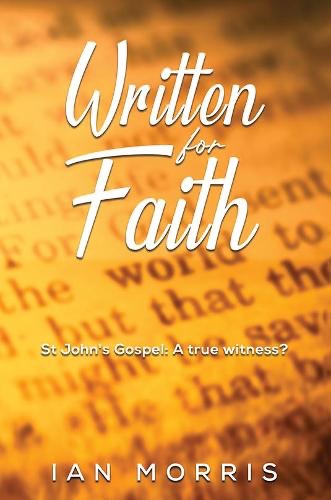Written for Faith - St John's Gospel: A true witness? by Ian Morris
Accessible exploration of John's gospel which challenges some long-held views. You may not agree with everything - but it will make you think
 Written for Faith - St John's Gospel: A true witness?
Written for Faith - St John's Gospel: A true witness?
By Ian Morris
Austin Macauley Publishers
ISBN: 9781398413535
Reviewed by Terry Young
I love John’s gospel and so Ian’s book attracted my attention on the review list, even though it turned out not to be quite what I expected. For me, Ian brings interesting ideas and explanations together but I also like thin, low cost, books that come as e-readers: bingo!
Unless you have a naïve or purely devotional interest in John, the scholars have subtly marked this gospel out of bounds. Their gunnery puts up a barrage against amateurs: isn’t John above their intellectual pay grade; shouldn’t they return when they have a PhD in the field; can they preach authoritatively from an account so clearly designed to make the facts fit its theology? Even the terminology – the Fourth Gospel – puts the text behind plate glass.
As a champion of accessible theology, Ian writes a succinct introduction to where the artillery is dug in. He also shares things he loves about John and picks a few puzzles out for us to think through with him: why no conventional parables; on what day of the week did Jesus have his last meal with his disciples; why does John’s Jesus speak so differently?
The surprise is that he takes the offensive by arguing that John was written early and independently of the synoptics (Matthew, Mark and Luke). The idea that John’s gospel might be the first we have is not new and Ian’s unlikely partner in this escapade wrote a book called Honest to God that shook a lot of Christians up in the late ‘60s. In terms of style, Written for Faith reads to me like Frank Morison’s Who moved the stone? – someone smart and well educated describing their personal encounter with a hot potato.
How you read will depend upon how aware you are of the scholarly debates around who wrote what in the New Testament, and where you place yourself on a spectrum between frank scepticism and a fundamentalist position on inerrancy. If all this is entirely new to you, it will probably be unsettling, but Chapter 2 – What’s the problem? – will get you up to speed.
After that, you are in Ian’s hands, so you’ll have to make up your mind whether you trust him or not. He is certainly bright. According to the blurb, he is a Cambridge medic who forgot to get off the academic merry-go-round and picked up another degree in Philosophy and Logic. The Methodists, with their circuits, also breed a creature in the Lay Preacher which is less common in Baptist circles: the truly amateur theologian, who does theology out of sheer love. Finally, as a grandfather, he has been around the block a few times.
But he doesn’t ask for blind trust: he’s a guide, not a guru. He invites you to walk with him and see if you reach the conclusions he has. I felt comfortable with his filter on the main lines of argument around how John is different, why the consensus is for a late date on John, and where John’s story is hard to square with what else we know about Jesus’ life, which is mainly from the synoptic gospels.
This is not a polemic, although there is an endearing sense in which Ian identifies strongly as a champion of John – to the extent, on occasion, of challenging Matthew, Mark and Luke. For me these were the least convincing elements of the case. I can see the tensions; it’s just that I would look around for more creative explanations, since I hate to think I have to love Luke less in order to love John more. And I think Ian would encourage his readers in such reflection.
What he won’t allow you to do is to drift away without thinking carefully about what the New Testament gospel writers were up to. They were clearly not operating within modern concepts of plagiarism, since so much almost identical phrasing is shared across the synoptics, for instance, with only 31 verses of Mark that you could not recover from Matthew or Luke (p 51). When Luke talks about producing an ‘orderly account’ (Luke 1:3), he does not envisage the boredom of a modern biography – these writers clearly chose what to include and to some extent what to drop, as well as what to group together. Having recently read Draft No. 4: On the Writing Process, I think John McPhee’s concept of ‘creative nonfiction’ provides a helpful 21st century perspective, even though he coined the phrase for entirely different reasons.
All this neglects how much space Ian also finds to reflect on those conversations, with Nathaniel or by the well, for instance. There is space to tell us about the ‘eyewitness’ moments, too, which he identifies as details that serve little narrative purpose but remind us that they would only be recalled by someone who was there. An example would be John 5:14: a comment that must have meant something at the time, is hard to understand now, and so must have reached us through an eyewitness.
Most challenging is Ian’s assertion that the disciples did not preach about Jesus, they preached Christ (1 Corinthians 1:23). John is not telling us what Jesus believed or even, primarily, what he taught or did: John is telling us about Jesus. John does not want us to believe about Jesus, but to believe in Jesus.
What more can I write? Buy! Read! Think…
Professor Terry Young is an author and member of a Baptist church. He set up Datchet Consulting which combines his experience in industry and academia
Baptist Times, 14/01/2022